- Home
- Matt Goldman
The Shallows--A Nils Shapiro Novel Page 16
The Shallows--A Nils Shapiro Novel Read online
Page 16
“I promise I’m not working.” She wasn’t smiling but her eyes lit up.
The waitress returned. “My manager said you can only order eight different slices of pie if you pay for them per slice. Sorry.”
“All right,” said Gabriella. “It was worth a shot. For my slices I want banana cream, rhubarb, chocolate silk, and peanut butter silk. Nils?”
“You took all the good ones.”
“Don’t dilly-dally, pal. You may miss an opportunity.”
I got home just before 2:00 A.M. I didn’t fall asleep until after 3:00, wondering exactly what opportunity I might be missing.
27
The call came at 8:01 A.M.
“I’m going to give you a chance to make amends, Nils Shapiro.” Delvin Peterson used my full name. That was twice in twelve hours.
I said, “What’s put you in such a generous mood?”
“Be at my office in half an hour.”
“Last time you wanted something from me you had the decency to buy me breakfast.”
“I’ll still buy you breakfast. But it’s coming out of a vending machine.” Delvin Peterson hung up.
I showered, threw on a T-shirt, threadbare jeans, running shoes, filled a travel mug with coffee, and pointed my lady station wagon north. I’d forgotten about Ernesto Cuellar’s fuzzy dice and suction-cup Jesus. I left them as a special treat for the gate guard at the FBI building.
Delvin Peterson met me in the lobby and escorted me up to Special Agent in Charge Colleen Milton’s office. Ellegaard was already there, sitting on a credenza. His choice of furniture and posture signaled all was well. Peterson stood near Milton, who sat behind her desk. A few other agents filled the room on chairs that had been brought in for the occasion. An assistant entered, pushing a cart containing a Dunn Brothers carton of coffee and an assortment of pastries. Peterson had lied about the vending machine. Best use of my tax dollars to date. I half expected an underling to bring me a comfy footstool.
Colleen Milton said, “It’s fortuitous, Mr. Shapiro, that our relationship survived the little disagreement we had in Edina a couple years ago.”
“Agreed. No sense burning a bridge I may want to jump off one day.”
She laughed a little too hard. A key skill to rise through the ranks. “I’ll make this quick. Since Stone Arch Investigations is already inside Halferin Silver, we’d like you to work as our C.I., specifically paying attention to the firm’s relationship with Karin Tressler. We suspect someone in Ms. Tressler’s organization—we don’t know who—bombed the office in an attempt to draw attention to and garner sympathy for the candidate for U.S. House of Representatives. How do you feel about the idea of working as our C.I.?”
“Good. I’m in.”
Silence. Ellegaard stood. Milton turned to him, and Ellegaard offered a slight shrug.
She said, “Are you being serious?”
“Yes. Why the sad faces? Isn’t that what you want?”
Delvin Peterson said, “So that’s it? End of conversation?”
“End of conversation.” I stood and headed toward the door. “Ellegaard will discuss our fee. Look forward to reporting in.” I walked out of Colleen Milton’s office and didn’t stop until I got into my car, then I headed for downtown and returned a call from Ian Halferin.
“Thanks for getting back to me so quickly, Nils,” said Halferin. “I was hoping you could come in today to discuss some details about the case.”
“I think I can. Just have to rally. Had kind of a rough night.”
“Are you all right? You catch that summer cold that’s going around?”
“No. Just had a few drinks on an empty stomach. You’d think I’d learn by age forty. I’m more embarrassed than sick, to be honest. Maybe it’s time to take a break from the brown stuff.”
Ian Halferin laughed the laugh of the relieved. My story confirmed what he had expected, that the drug had worked—I apparently didn’t remember a thing about a parking lot, a van, or him. “You wouldn’t be a private detective if you didn’t knock a few back, right? Glad to know I hired the real deal.”
Whatever Ian Halferin was up to, it appeared not to include Celeste Sorensen. If Celeste had told him about me bumping into her last night, he probably wouldn’t have sounded so nonchalant. He specialized in contract law—he was no litigator—so he was no performer.
“I think I can make it around noon. Does that work?”
He said it did, and I went to the office on SE Main Street to meet Ellegaard for an FBI postmortem. But when I walked into his office, someone other than Ellegaard sat at his desk. At least someone other than Anders Ellegaard. Emma Ellegaard, her dark hair bunched on top of her head, sorted a pile of receipts into half a dozen piles.
I said, “I hope your dad’s paying you for that.”
“He’s not,” said Emma, her eyes on the piles. She sorted the last few receipts then looked up and smiled. “Hi, Nils.” She wore one of her mom’s old University of Wisconsin Badgers T-shirts. The red cotton had faded to a dark pink, and only a faint Bucky Badger, chest pumped out, remained. Her parents met at Madison during freshman orientation, married their second year, and both graduated at the end of their third year. Anders then attended the Minneapolis Police Academy with Gabriella Núñez and me. Molly went to law school.
I said, “Are you with us all day?”
Emma rolled her eyes and scrunched her mouth into something between resignation and disapproval. “Yes.”
“It’s better than babysitting your little sister, isn’t it?”
“I guess.” She looked out the open door to see if anyone was coming, then said, “Nils, I don’t want to start high school next week.”
“Why not?”
“It’s going to be stupid.”
“It’s supposed to be stupid. It’s high school.”
“You said I need to be true to myself.”
“There’s a difference between being true to yourself and doing whatever the hell you want.”
“I want to take classes at the University of Minnesota.”
“Is that possible? You’re fifteen years old.”
“I’ll be sixteen next month. Besides, age doesn’t matter. I skipped a grade, and any high school junior or senior can take classes at the U if their GPA is high enough, and mine is. Full college credit and totally free. I know lots of kids taking classes there.”
“I know one, too,” I said, thinking of my Volvo’s new decor. “So, what’s the problem?”
“My parents said no.”
“They must have had a good reason.” Emma kept her eyes on me but drifted away to somewhere distant. Her sadness overpowered the corporate blah of her father’s office. The air-conditioning’s constant exhale inflated a long silence.
I said, “Do you want me to talk to them?”
“Nils, you’re here. Good,” said Ellegaard, walking into his office, his attention on a sheet of paper. “Annika will join us in ten. She wants to fill us in on her evening with Celeste Sorensen.”
Emma Ellegaard flipped a switch. She was happy and present and said, “I sorted all your receipts.”
“Thank you, honey.”
“One of those piles is your lunch receipts. Dad, you eat at Chipotle way too much.”
“You’re right. I do. So, take this credit card and walk over to Lunds and get us stuff to make sandwiches. And Emma—”
“I know, Dad. Keep the receipt.”
Emma took Ellie’s credit card, gave me a look that said don’t say anything, and traipsed out of the office. Ellegaard handed me the document and said, “Interesting turn of events this morning.”
I said, “You finally found a conflict of interest you like.”
“Let’s just say I trust the FBI.”
I read the FBI confidential informant agreement, or at least enough of it to know that’s what it was. I handed it back to my partner, wondering if I should say something about Emma’s wish to leapfrog high school, but let it go. I sat in one of the
chairs opposite Ellegaard’s desk and said, “Ian Halferin doesn’t want Karin Tressler to know about what happened in the van last night. Is that because he doesn’t want her to know they supposedly drugged me and looked at my phone, or is it because she ordered them to do so, but they didn’t find what they were looking for?”
“If Karin Tressler’s brother is involved then I’d guess she is, too.”
“Will you vote for her in November?”
Ellegaard hesitated. He rested his left ankle across his right knee. Politics didn’t get in the way of our friendship. We agreed on almost everything but had somehow found ourselves on different teams. The teams and their noisy mouthpieces are bullshit, of course. He knows it. I know it. Any person who’s honest with the world and themselves knows it. Party over politics. Every issue. Every day. Every party. Two-dimensional characters make great heroes and villains. And who doesn’t love a great hero or villain? More fundamental untruths than in a superhero movie.
Ellegaard rubbed his black-socked ankle and smiled. “She’s one I won’t vote for.”
I laughed. “No wonder you’re so excited about working for the FBI. You help bring her down, someone else will step in. Someone you can vote for.”
Ellegaard smiled and nodded, a rare admission of ulterior motive. Hell, a rare occurrence of ulterior motive for my friend with adult-onset Boy Scout syndrome.
Annika entered, sleepy-eyed and slow. “You’re lucky you left last night,” she said, “the party was just getting started.”
I said, “Does Celeste Sorensen ever sleep?”
“Apparently not. We were the last people out of there at two A.M. I started drinking coffee at midnight. Celeste kept sucking down cosmos. She wouldn’t stop talking. It’s like she’s never had a friend before.”
“Anything interesting?” said Ellegaard.
“Yeah,” said Annika. “I think she’s having an affair.”
I said, “Really? The woman who shamed me for being divorced?”
“That very woman.”
“But you only think she’s having an affair? She didn’t admit it.”
“Not directly, no. But she talked a lot about sex. She said she used to think it was normal men didn’t want to do it very often. I asked what she meant by not very often. She said three or four times a year. I agreed that wasn’t very often. And then she said she used to think men could only achieve climax—her words—if they did it from behind. She thought everything she saw on TV and in the movies was fake. But then she found out it wasn’t fake. Of course, I asked how she found out, but all she said was she had her ways. But it was the grin on her face when she said it. You know when people are getting it. And a lot of it. They all have that stupid grin.”
“Like on Ellegaard’s face?”
Ellegaard laughed. “Hold on,” he said. “If Celeste is having an affair, is that relevant to our investigation?”
I said, “Depends on who she’s having an affair with. Or had an affair with.” I looked at Annika. “Was it with Todd Rabinowitz?”
“I don’t know. She was pretty drunk, so I playfully asked her if she had a new man in her life. But her grin disappeared and she denied it, saying she was a married woman.”
Ellegaard said, “How do we find out if she had an affair with Todd Rabinowitz?”
“Oh,” I said, “you know, the usual way. Stake out Todd Rabinowitz’s grave, see if she shows up. Take photos of Todd and Celeste around to romantic restaurants, ask if anyone recognizes them as a couple. Hack into Celeste’s email—”
“We’re not hacking into anyone’s email,” said Ellegaard.
“What about Todd’s email? He’s dead.”
“No,” said Ellegaard.
“Who’s going to complain? He’s d—”
“No.”
“We could,” said Annika, “ask Ian Halferin for access to Celeste and Todd’s work emails. Halferin Silver owns them, not its employees. It’s a long shot, but you never know.”
Ellegaard made a that’s an idea face then looked to me for confirmation.
28
Arndt Kjellgren’s sculpture was no longer in the Halferin Silver reception area. If he’d written a book they would have burned it. But he’d made a big metal kinetic sculpture so they hired someone to take it away.
Construction workers carried out charred debris and carried in new boards of Sheetrock, presumably rebuilding the mail room. The sprinkler system had limited the damage, but it smelled like you were sitting on the downwind side of a campfire.
The receptionist on the rolly chair swiveled behind her cherrywood desk. She wore a sleeveless lime green blouse that looked neon parked under her jet-black hair. I avoided staring too long because she might have been watching me. I couldn’t tell. She wore plastic film over her eyes, the sunglasses-shaped kind the eye doctor gives you after administering dilation drops. Apparently, she’d had her retinas looked at and wanted everyone to know.
“Mr. Halferin will be with you in a few more minutes,” she said.
“Thank you.”
She smiled and kept her face pointed in my direction, pleading for me to mention her eye protection, but I didn’t feel like giving her the satisfaction of repeating whatever the doctor said about macular degeneration or glaucoma and the importance of getting your eyes examined every year. That didn’t stop her. She sighed loudly enough to be heard across the swollen Mississippi. “Well…,” she said, “one more hour and I can lose these ridiculous glasses.”
“You sure? They’re kind of awesome.”
She said, “Oh, you … You’re just being a smart aleck.” I hadn’t been called a smart aleck since the last millennium. “Where did you go to high school, Mr. Shapiro?”
“Armstrong.”
“My cousin, Dana Glass, is about your age. She went to Armstrong. Do you know her?”
“I don’t think so. But I’m older than I look. Maybe we missed each other.”
“She’s forty. How old are you?”
“Huh. Apparently, my looks are catching up with me.”
“Ian is ready for you now,” said Celeste Sorensen, who had appeared from nowhere like a ghost or speed trap cop. She looked bright and cheerful despite her night of drinking and said nothing about our conversation at Bar Louie. I trailed in her wake of soapiness, past the signed prints to the big office at the end of the hall. She wore a sleeveless frock and her arms looked like she’d just done a thousand push-ups. We entered Ian Halferin’s office. He stood with his back to me, looking out one of his floor-to-ceiling windows. The city of green and blue looked like a soft-focus photograph, the water in its lakes, streams, and lawns evaporating into haze.
“Can I get you anything?” said Celeste.
I used my nice words to say no. Ian thanked her for bringing me in. Then Celeste Sorensen left, closing the door behind her.
“Maybe we’ll get that thunderstorm they keep promising,” said Halferin. Gray pants, white shirt, and his suit jacket draped on the back of his chair. He turned around to reveal a minty green tie with tiny red dots. I don’t know much about fashion, but I would have gone with something different. He stepped forward and shook my hand. “Feeling better?”
“Much. Thank you.”
He returned to the window and said, “I never get tired of this view. This city pulls us all back. Even the ones who make it big in New York or L.A. or London or Paris—we all come back. Why do you think that is?”
“I don’t know,” I said. “I never left.”
“Really?”
“I got busy then hit a few bumps and then got busy again. Maybe someday.”
Ian sat at his desk. I walked over to the window. He said, “You should. You’ll appreciate this town that much more after being away.”
“Where did you go?”
“Duke University for undergrad, then lived in Israel a year, then went to law school at Northwestern. I worked in Chicago for a couple years, took the Minnesota bar, and came home. Married a girl I met in sec
ond grade. I was gone ten years, and I’m a better Minnesotan because of it.”
“You came back because of the second-grader?”
He laughed. “No, no. I came back because Minnesotans are like salmon. We return to where we were born to create young of our own. Then I met the woman who happened to be my classmate in second grade. Do you have kids, Nils?”
The heat had boiled the blue out of the sky. It was a cloudless grayish white, dormant and stagnant, like if you put your head in a white pillowcase and breathed that all day.
“Not yet,” I said. Explaining Micaela, who she is, who she was, and her pregnancy felt too complicated. “Hopefully soon.”
“Your outlook changes when you have kids. You get less forgiving of the world and its ways because you want it to be better for your kids. Do you know what I mean?”
“Not really.”
“I suppose that makes sense. You don’t have kids. But take my word for it, you want them to have the same opportunities you had. You want to make sure the world doesn’t go bad before they get a chance to make their mark.”
I turned away from the window. “Is that what you wanted to see me about?” I sat in the chair across from Halferin. “Because it hardly seems worth paying our rate.”
Halferin smiled. “No, Nils. I want to talk to you about Arndt Kjellgren.”
“The killer.”
“Yes. His sculptures are all over the city. Kjellgren is a local hero. You know how this town is. Anyone who makes something of themselves, they’re heroes for life, regardless of whatever transgressions they commit.” He pushed back in his chair. “Charles Lindberg, Nazi sympathizer. Still a hero. Kirby Puckett, alleged groper, still a hero. I want you to find so much dirt on Kjellgren that he doesn’t have a chance of going that route.”
“Huh,” I said. “Some shrewd brain out there might think you’re trying to devalue Kjellgren’s sculptures so you can pick up a few on the cheap.”
“I wish it were that simple. The truth is I want to bury Kjellgren in so much stink he can’t be revived.”
“So dig up more dirt on him?”

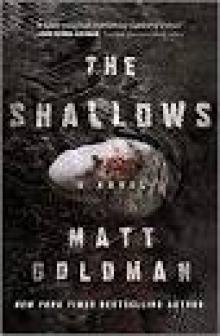 The Shallows--A Nils Shapiro Novel
The Shallows--A Nils Shapiro Novel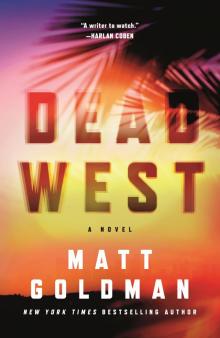 Dead West
Dead West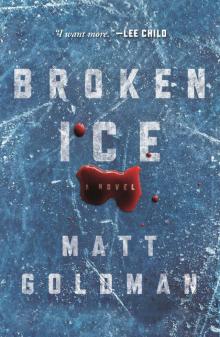 Broken Ice
Broken Ice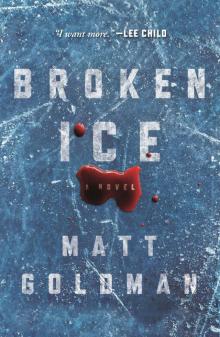 Broken Ice--A Novel
Broken Ice--A Novel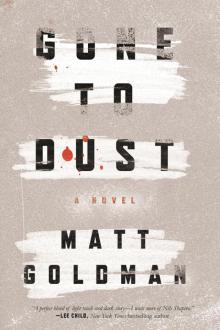 Gone to Dust
Gone to Dust